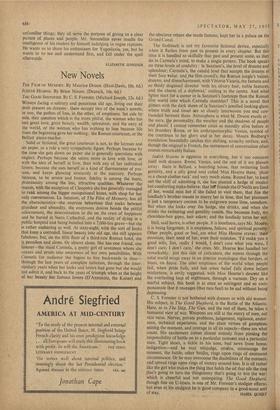New Novels
THE GOOD SHEPHERD. By C. S. Forester. (Michael Joseph, 12s. 6d.) WOMEN facing a solitary and penurious old age, living out their drab present on dreams : these occupy two of the week's novels; in one, the pathos of loss, in the other, of emptiness. Set side by side, they question which is the more pitiful, the woman who has loSt great love, great beauty, wealth, splendour, and the envy of the world, or the woman who has nothing to lose because life from the beginning gave her nothing : the Roman courtesan, or the Belfast piano-teacher.
the obscurer others she made famous, kept her in a palace on the Grand Canal.
The flashback is not my favourite fictional device, especially when it flashes from past to present in every chapter. But this time it is handled so skilfully that past and present unite, as they do in Carmela's mind, to make a single pattern. The book speaks on three levels of credulity : la Sanziani's, the level of dreams and splendour; Carmela's, the candid level that accepts the dreams at their face value; and.the film crowd's, the Roman jungle's values, dreams, and disenchantment, with Vittorio Vicaria, the famous and so thinly disguised director 'with his silvery hair, noble features, and the charm of a diplomat,' smiling at the centre. And what bitter start for a career in la Sanziani's footsteps than the Roman film world into which Carmela stumbles? This is a novel that glitters with the dark sheen of la Sanziani's jewelled looking-glass, where truth and tinsel are so closely interwoven you end con- founded between them. Atmosphere is what M. Druon excels at : the aura, the personality, the weather and the shadows of people and places. I cannot remember cities so moodily alive before as his thundery Rome, or his anthropomorphic Venice, symbol of the courtesan in her glory and in her decay. Moura Budberg's translation beautifully catches this shifting, scratchy surface, and, though the original is French, the movement of conversation often sounds remarkably Italian.
Judith Hearne is opposite in everything, but it too concerns itself with dreams. Rome, Venice, and the rest of it are planets away: there is Belfast, a boarding house, that twittering Irish gentility, and a silly good soul called Miss Hearne there, 'plain as a cheap clothes rack' and very much alone. Round her, to keep out the chill of admitting it, she has planted a hedge of modest but comforting make-believe: that het friends the O'Neills are fond of her, would miss hei• if she failed to visit them, that Jim the landlady's brother means to marry her in time, that her plainness is just a temporary cocoon to be outgrown some time, somehow. But when she looks over the hedge, she drinks, and when she drinks the twittering and gentility vanish. She becomes Judy, the chocolate-box gipsy, hair askew; and the landlady turns her out.


































 Previous page
Previous page